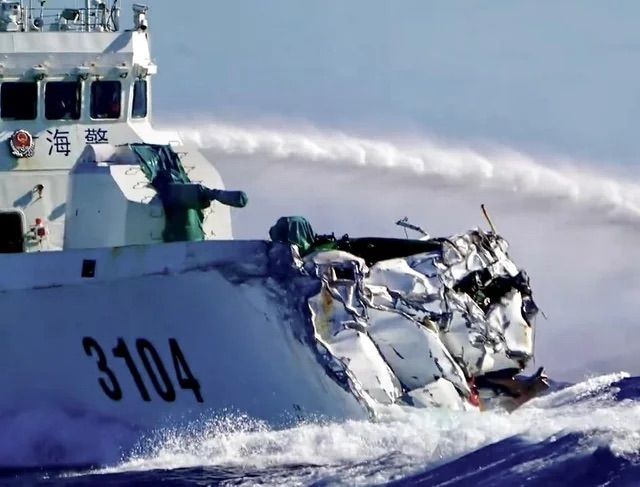China's Navy Plays Stupid Games, Wins Stupid Prizes

I was actually on Philippine television Monday morning at the moment it happened. I was updating Morning Matters host Gretchen Ho about China’s unusual deployment of coast guard ships around the northern Batanes Islands and its likely relationship to President Marcos' recent comments about Taiwan.
That seemed important at the time. And it was ... until this happened:
By the time I returned to my hotel room after the interview, the astonishing early videos of the event were already circulating around Manila and beyond.
This incident, while highly consequential in its own right (and tragic for the unknown number of China Coast Guard sailors who almost certainly were casualties of the event), becomes even more important when we set it in context. Here are eight things you need to know.
- This was a major escalation by China in an ongoing and increasingly high-stakes gray zone war over the South China Sea. In past events, China had been content to let its paramilitary forces--it's "wolf-in-a-white-hull" China Coast Guard and the "little blue men" of the maritime militia--take the lead in asserting China's vast maritime claims. It had largely kept its gray-hulled military vessels back at a distance so as to be detached (yet still menacing) from the blocking, swarming, water-cannoning and ramming which it has normalized as "law enforcement" measures over the past 3 years.
- This was the culmination of China's 13-year takeover of Scarborough Shoal--a process that began in 2012 and accelerated starting in mid-2024 when it established a 25-30 nautical mile exclusion zone around the shoal--a story SeaLight first broke in May and which was confirmed by the Asia Maritime Transparency Initiative in June.

- This was a bellicose message that Beijing is no longer tolerating Philippine vessels approaching the shoal at all, despite the fact that Philippine fishing communities along the coast of Luzon relied on the shoal for their livelihood for countless generations, and that the 2016 Arbitral Award--which China rejects but an increasing number of countries now affirm--unambiguously found that Beijing's restrictions on this activity were unlawful.

- This was a reflection of Beijing's growing maritime militancy. The behavior of China's destroyer in particular illustrates this fact. Not only did its captain--as likely advised by the ship's political officer--feel duty bound to become directly involved in a "law enforcement" matter, he further continued the aggressive pursuit after the collision. This means that he prioritized keeping a single 44-meter Philippine Coast Guard vessel away from an uninhabited shoal--one which until recently they were allowed to approach regularly--over providing mutual support to a China Coast Guard ship and crew that had just suffered catastrophic damage, including likely casualties and personnel overboard.
- This was a reminder that the Philippine Coast Guard routinely faces extreme peril with impressive courage and professionalism. We have seen countless incidents since early 2023 which illustrate this fact, but it cannot be stated too often. This may be the bravest coast guard on the planet today, and the scene in which the BRP Teresa Magbanua offers medical support to the very ship that was just trying to run down its compatriots is inspiring.
- This is a testament to the plight of Philippines and the disintegration of the rules-based order that kept the world relatively peaceful for the past 80 years. Much like a maritime Crimea in 2014, we have been watching a hostile imperial power carry out a maritime occupation of a smaller neighbor's sovereign entitlements by means of paramilitary force, and still the world does not seem to have a good answer to how to counter gray zone warfare.
- This was an illustration of the absurdity of Beijing's state propagandists, who for four surreal days continued to demand that the Philippines bears responsibility for the incident and even demanded "compensation". Yet at the same time it apparently did not have permission to admit why compensation might actually be owed. It wasn't until today that finally the first Global Times articles appeared admitting to a "collision" (which of course occurred only due to the heroism and restraint of the valiant PRC crew...or something).
- This is a sobering reminder that China's belligerence is bringing us perilously close to the brink. It's really not hard to imagine how this could have gone quite a different direction. Had the destroyer struck the much smaller Philippine ship instead of its own, how many Filipinos would have died ... and if your coast guard ship is rammed by a destroyer while approaching a maritime feature that has essentially been stolen from you, does that constitute and "armed attack"? I discussed that very possibility just last year with 60 Minutes:
My Why Should We Care About the Indo-Pacific? podcast co-host Jim Carouso and I talked through all of this and more on a special "emergency" episode on Wednesday. I invite you to take a watch/listen:
*Final note: Credit for the title goes to Tom Shugart, who I think was the first to mention this highly appropriate term in relation to this event.




